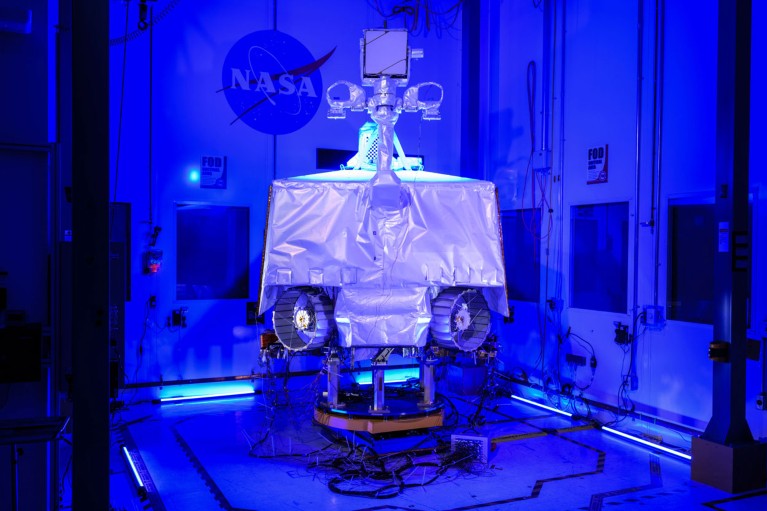Hello Nature readers, would you like to get this Briefing in your inbox free every day? Sign up here.

The completed Volatiles Investigating Polar Exploration Rover (VIPER) sits in a cleanroom at NASA’s Johnson Space Center in Houston, Texas.Credit: NASA
NASA has cancelled a mission to drill for ice on the Moon — even though the rover has already been completed. The Volatiles Investigating Polar Exploration Rover (VIPER) has already cost US$450 million and would have required millions more — threatening funding for other launches. If you’re in the market for a Moon rover, NASA is looking for someone to take it on — otherwise it will be dismantled and its components used for other projects.
Nature | 4 min read
A signalling molecule that helps to kick-start inflammation in the lungs could play a key part in aggravating some long COVID symptoms. Previous research has shown that people with long COVID have elevated levels of the molecule, called interferon gamma (IFN-γ). By inhibiting IFN-γ in mice with COVID-19, “we were able to dampen the chronic conditions after infection”, says immunology researcher and study co-author Jie Sun. “In the future, we could target this pathway for potential treatment of long COVID.”
Nature | 4 min read
Reference: Science Translational Medicine paper
Image of the week
Table of Contents

From 2026, plants such as Erythrina caffra will instead be known as Erythrina affra.Credit: Orazio Puccio/Alamy
From 2026, plants such as this coast coral tree will get a name change — in its case, from Erythrina caffra to Erythrina affra. (‘Caffra’ comes from a word also used as a racial slur; ‘affra’ recognizes Africa.) More than 200 plants, fungi and algae species names will be affected. Botanists at the International Botanical Congress in Madrid also voted yesterday to form an ethics committee that can reject new names that are deemed derogatory. (Nature | 4 min read)
Features & opinion
Nineteen genetic therapies have been approved in the United States, including the breakthrough CRISPR genome-editing therapy for sickle cell disease, Casgevy. But most people will never be able to afford them — Casgevy, for example, costs US$2.2 million per patient. A task force of genomic-therapy luminaries shares its suggestions to increase affordability and access, including a pricing structure that could reduce per-patient cost tenfold.
Nature | 45 min read
The signs of a predatory conference can be hard to spot — until you walk into an empty room. “I just remember the feeling of my heart starting to pound, like ‘Oh my God, there’s nothing here’,” recalls communications researcher Vicki Mayer, who travelled from the US to the UK for a conference that never materialized. But not every scientist involved is getting suckered — some are seizing an opportunity, no matter how dubious, to further their careers. “When I started my research, I assumed that most academics were unwittingly attending,” says business-administration scholar James McCrostie. “Most, but certainly not all, either know the conference has no value or they want to pretend to themselves they don’t know.”
Nature | 9 min read
A precocious rule-breaker is seen for who he really is in the latest short story for Nature’s Futures series.
Nature | 6 min read
Researchers have enhanced a biodegradable plastic with an enzyme so that it doesn’t need a special high-temperature facility to break down. They isolated a new enzyme — dubbed PAM (protease from Actinomadura) — from a bacterium and beefed it up so that it could survive the high temperatures required to make plastic in the first place. Then they came up with a process to produce PAM-packed plastic that would biodegrade in home compost and soil — while still being robust enough to use as packaging.
Nature Podcast | 28 min listen
Subscribe to the Nature Podcast on Apple Podcasts, Spotify or YouTube Music, or use the RSS feed.
